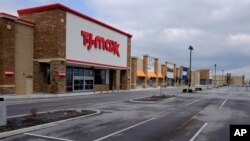Millions more Americans likely sought unemployment benefits last week, lifting total filings for claims over the past month above an astounding 20 million, which would underscore the deepening economic slump caused by the novel coronavirus outbreak.
Thursday's weekly jobless claims report from the Labor Department will follow dismal data on Wednesday showing a record drop in retail sales in March and the biggest decline in factory output since 1946.
Economists are predicting the economy, which they believe is already in recession, contracted in the first quarter at its sharpest pace since World War II.
Weekly jobless claims, the most timely data on the economy's health, are being closely watched for clues on the depth of the downturn, when the waves of layoffs may let up and when a recovery might start.
"The decline in economic activity is breathtaking," said Joel Naroff, chief economist at Naroff Economics in Holland, Pennsylvania. "While we will see an initial upturn once the economy reopens, the strength and length of that recovery is not clear at all."
Initial claims for state unemployment benefits probably totaled 5.105 million in the week ended April 11, according to a Reuters survey of economists -- a staggering number even though lower than the previous week's 6.606 million. Estimates in the survey were as high as 8 million.
Going by the average forecast, last week's claims data would bring the cumulative unemployment benefits claims to more than 20 million since the week ending March 21.
Economists are divided on whether the anticipated second straight weekly decline in claims suggests that filings peaked at a record 6.867 million in the week ended March 28, or that overwhelmed state employment offices were unable to process the flood of applications.
"We expect that claims will remain very elevated in coming weeks as states struggle to clear backlogs and more companies lay off workers in response to the shutdown," said Joseph Briggs, an economist at Goldman Sachs in New York.
"Including this week, we currently project an additional 20 million in initial jobless claims through the end of May, after which we expect new claims to fall to levels consistent with prior recessions."
Economic carnage
States and local governments have issued "stay-at-home" or "shelter-in-place" orders affecting more than 90 percent of Americans to control the spread of COVID-19, the respiratory illness caused by the virus, and abruptly halting economic activity. Retail sales and production at factories tanked in March.
Economists are estimating the economy contracted as much as 10.8 percent in the first quarter, which would be the steepest drop in gross domestic product since 1947. They say a historic $2.3 trillion fiscal package, which made provisions for cash payments to some families and boosted unemployment benefit checks, will likely provide little cushion to the economy.
Economists say the economy entered recession in March. The National Bureau of Economic Research, the private research institute regarded as the arbiter of U.S. recessions, does not define a recession as two consecutive quarters of decline in real GDP, as is the rule of thumb in many countries. Instead, it looks for a drop in activity, spread across the economy and lasting more than a few months.
Jobless claims filed this week, data for which will be published next Thursday, will have additional significance as they will cover the period during which the government surveyed business establishments for its April employment report.
Economists expect millions of job losses this month after the economy purged 701,000 jobs in March, the biggest loss of jobs since the 2007-09 Great Recession.
Last month's job losses also ended an employment boom that started in late 2010, which was the longest in U.S. history.
"The speed and scale of job losses will be more similar to a natural disaster than a typical recession," said Dante DeAntonio, an economist at Moody's Analytics in West Chester, Pennsylvania. "Overall job losses in April could be 10 to 20 times larger than those in March."
Thursday's claims report is also expected to show the number of people continuing to receive benefits after an initial week of aid raced to a fresh record of 13.5 million from almost 7.5 million in the prior week, according to the Reuters survey.
The so-called continuing claims data is reported with a one-week lag and is viewed as a better gauge of unemployment.
Economists expect the unemployment rate will in April blow past the Great Recession's peak of 10 percent and the post-World War II high of 10.8 percent touched in December 1982.









